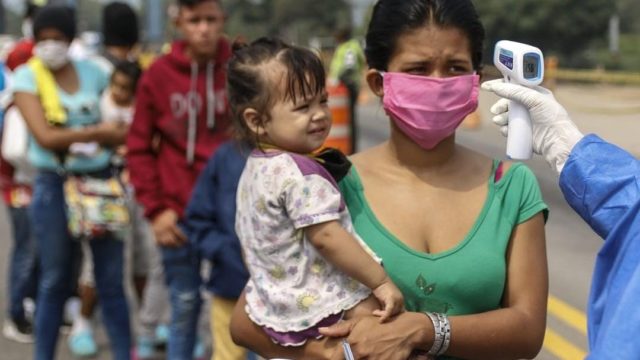
In the Americas, there are up to 18 million people engaged in domestic work, of which 93% are women, according to the Economic Commission for Latin America and the Caribbean (ECLAC).
With a long history of exclusion and job insecurity, domestic workers in Latin America are suffering fully from the economic effects of the Pandemic, which has left them confined and unemployed.
“They told me to excuse them, but that now I couldn’t work. I am a conscious person, I see what is happening to us, but I hope to be able to return to my work soon,” Mexican Carmen Hernández, 59, a domestic employee for more than 15 years, tells us.
Without income, since most are governed by word contracts, the COVID-19 has shown its vulnerability. Seven out of ten are unemployed or lost work hours due to quarantines, according to ECLAC, which calculates its labor informality at 77%. In Brazil, for example, of the 4.9 million jobs that were lost between February and April, 727,000 were in domestic services.
A critical situation for a sector where wages in themselves do not give enough. In Latin America, they are equal to or less than 50% of what other workers earn on average, despite the efforts of some countries to regularize the activity, according to ECLAC.
To complete her income, Carmen cleans five houses a week. Without a job since May, she was offered to return to one soon. But normalization seems distant when the novel Coronavirus hits the region hard, where it has left so far 2.4 million infections and some 111,000 dead.
Discrimination

The Pandemic has also highlighted discrimination against domestic workers in the region, where this work represents up to 14.3% of female employment. In Brazil, with six million of these employees, most of them black women from marginal areas, many were forced to continue working, risking contagion on public transport. One of the first fatalities – of the more than 57,000 accumulated – was a 63-year-old woman who worked in an exclusive neighborhood in Rio de Janeiro, infected by her employer after returning from vacation in Italy.
Another case that shocked the country was the death of a five-year-old boy, the son of a domestic worker, in a luxury building in Recife (northeast), who fell from the ninth floor while under the care of the employer, while his mother – who took him to work because she had no one to leave him with- walked the family dog.
In Argentina, the case of a businessman from Tandil who hid his domestic worker in the trunk of the car to enter private urbanization, violating the quarantine, also had repercussions. In this country, half of the 1.4 million domestic workers lack social security.
Likewise, in Peru, about 60 employees became infected in the first three months of the emergency. “The crisis has exacerbated existing vulnerabilities and inequalities in domestic staff”, says Vinicius Pinheiro, regional director of the International Labor Organization (ILO).
In Mexico, with 2.3 million female domestic workers, the award-winning filmmaker and Oscar winner, Alfonso Cuarón, support a campaign for employers to continue paying their salaries. Cuarón has a particular sensitivity for these women, which he captured in his film “Roma” (2018), dedicated to Liberia Rodríguez, the employee who helped raise him.
A group of children of Brazilian workers also released the manifesto “For the life of our mothers”, asking for a paid quarantine. To help vulnerable groups like this, the governments of Brazil and Argentina provide emergency subsidies. In some countries, informality hinders access to official support. Aged 75, Elena Mendoza, who served an American couple in Mexico City, receives no quarantine pay or government aid. Neither does gratitude. “I found out from the car washers that they had returned to New York. I think that in the rush they couldn’t tell me directly,” justifies the old woman.

